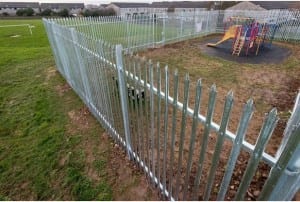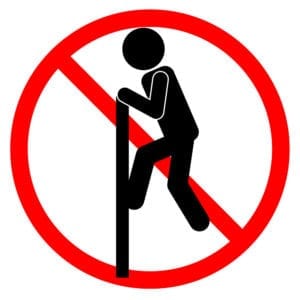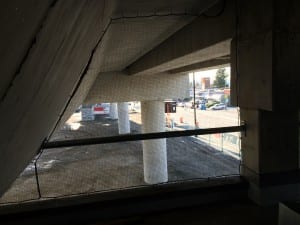
by Pigeon Patrol | Jun 18, 2016 | 4-S Gel Bird repellent, Bird Deterrent Products, Bird Netting, Pigeon Patrol's Services
 Parts of a derelict Perth city centre church present a “very real fire risk”, a survey of the building has found.
Parts of a derelict Perth city centre church present a “very real fire risk”, a survey of the building has found.
Sections of St Paul’s Church cannot be entered for safety reasons and it contains an infestation of pigeons and serious dry rot.
The findings were made by Perth and Kinross Heritage Trust, which recommended anyone entering should check their tetanus status due to sharp timber, glass and metal edges caused by vandalism and decay.
The survey document also states the listed building has “no ground whatsoever” and has a partially collapsed ceiling.
A separate structural engineering assessment recently carried out for the council claims St Paul’s Church is currently in a “very poor condition” with “little if any maintenance”.
It states: “There is significant water penetration into the building through the main roof. Left unchecked this could lead to failure of key elements of the roof structure… and collapse of the roof.
“Material is at risk of falling on to the public areas – roads and pavements – surrounding the building. The guano and dead birds present a significant health hazard to anyone entering it.”
The findings came to light as The Courier learned Perth and Kinross Council is still considering a compulsory purchase of St Paul’s if the present owner, James Boyd, of Belfast-based Simple Global Marketing, does not press ahead with his plan for a café/ community heritage use.
The trust report says efforts will have to be made to address nesting pigeons inside the building after attempts to keep them out with chicken wire failed.
It states: “Galvanised chicken wire is to be fixed to the timber louvres in the belfry openings and to all other window openings where pigeons are gaining access.
“Once access has been restricted those pigeons still within the building are to be humanely dispatched.
“The dome plasterwork, and particularly the cornice, is historically important and very insecure so it must not be damaged with air-gun pellets.
“Roosting and nesting has been ongoing inside and within the fabric of the building for a long time and consequently several shooting visits or an extended trapping campaign will be needed.”
The report also states that serious dry rot has rendered some upper parts of the gallery “potentially unsafe” with principal structural beams said to be rotting and missing in some places.
It has also been revealed there have been “significant” falls of plaster from the dome.
Mr Boyd said: “We are discussing extensive urgent works with the council and Historic Scotland. These will be several months long.”
About Pigeon Patrol:
Pigeon Patrol Products & Services is the leading manufacturer and distributor of bird deterrent (control) products in Canada. Pigeon Patrol products have solved pest bird problems in industrial, commercial, and residential settings since 2000, by using safe and humane bird deterrents with only bird and animal friendly solutions. At Pigeon Patrol, we manufacture and offer a variety of bird deterrents, ranging from Ultra-flex Bird Spikes with UV protection, Bird Netting, 4-S Gel and the best Ultrasonic and audible sound devices on the market today.
Voted Best Canadian wholesaler for Bird Deterrent products four years in a row.
Contact Info: 1- 877– 4– NO-BIRD (www.pigeonpatrol.ca)

by Pigeon Patrol | Jun 17, 2016 | Bird Netting, Pigeon Patrol's Services, Pigeon Spikes, Pigeons in the News

A video given to Channel 2 shows the capture of a psychiatric patient who ran from Southwest Memorial Hermann Hospital on Monday morning.
In nothing but a hospital gown, witnesses say the man was jumping fences in a neighborhood off Beechnut.
“I saw the security from the hospital following somebody. Then I told them he’s over there,” Milly Reyes said. “He jumped and went to over there to my house.”
She said the man was hiding behind air-conditioner units, in bushes and eventually made it to her shed. Police found him hiding there.
“Once police knew he was in my shed, he got out but they chased him for five minutes,” she said.
They eventually caught him near apartments across from Houston Baptist University.
About Pigeon Patrol:
Pigeon Patrol Products & Services is the leading manufacturer and distributor of bird deterrent (control) products in Canada. Pigeon Patrol products have solved pest bird problems in industrial, commercial, and residential settings since 2000, by using safe and humane bird deterrents with only bird and animal friendly solutions. At Pigeon Patrol, we manufacture and offer a variety of bird deterrents, ranging from Ultra-flex Bird Spikes with UV protection, Bird Netting, 4-S Gel and the best Ultrasonic and audible sound devices on the market today.
Voted Best Canadian wholesaler for Bird Deterrent products four years in a row.
Contact Info: 1- 877– 4– NO-BIRD (www.pigeonpatrol.ca)

by Pigeon Patrol | Jun 16, 2016 | Animal Deterrent Products, Bird Netting, Pigeon Patrol's Services, Pigeon Spikes
 A MAN who allegedly sped off from police and drove dangerously before jumping fences has been arrested.
A MAN who allegedly sped off from police and drove dangerously before jumping fences has been arrested.
Hervey Bay Police Station’s Senior Sergeant Darryn Morris said the 35-year-old accelerated after police activated their lights on Long St, Point Vernon.
It is alleged the man drove onto the wrong side of the road near the esplanade and cut across a roundabout before pulling up and entering a residential yard.
Snr Sgt Morris said the Point Vernon man jumped several fences.
The police dog squad was brought in and after sighting the man and calling out to him, he came forward and was arrested.
He has been charged with the dangerous operation of a motor vehicle, evading police, driving unlicensed and for an alleged low-range blood alcohol reading.
The incident took place about 2.30pm Saturday.
Snr Sgt Morris wasn’t sure exactly how long the incident lasted.
A court date has been set for January 7.
About Pigeon Patrol:
Pigeon Patrol Products & Services is the leading manufacturer and distributor of bird deterrent (control) products in Canada. Pigeon Patrol products have solved pest bird problems in industrial, commercial, and residential settings since 2000, by using safe and humane bird deterrents with only bird and animal friendly solutions. At Pigeon Patrol, we manufacture and offer a variety of bird deterrents, ranging from Ultra-flex Bird Spikes with UV protection, Bird Netting, 4-S Gel and the best Ultrasonic and audible sound devices on the market today.
Voted Best Canadian wholesaler for Bird Deterrent products four years in a row.
Contact Info: 1- 877– 4– NO-BIRD (www.pigeonpatrol.ca)

by Pigeon Patrol | Jun 15, 2016 | Bird Netting, Pigeon Patrol's Services, Pigeons in the News, UltraSonic Bird Control
 Norbiton residents passing under a popular railway bridge were fed up of being dumped on by pigeons.
Norbiton residents passing under a popular railway bridge were fed up of being dumped on by pigeons.
Nearly 100 people who lived near Norbiton Bridge signed a petition demanding that something be done to prevent the birds that lived in the rafters, making a mess.
Councillor Sheila Griffin said: “This is an ongoing problem and for some time many of my constituents have complained that they are sick of being dropped on by pigeons when they walk under the bridge.
“They have had expensive suits stained and the birds have also made a real mess of the pavements on Coombe Road.”
She added that it was the railway provider that should accept responsibility for the bird mess.
This was not the first time efforts had been made to get the birds to clean up their act.
The bridge had been pigeon-proofed some time before with netting, but so many of the birds had got caught in it that the plan was abandoned.
This time around, the Royal Society for the Protection of Birds got involved to ensure that a strict protocol was adhered to and no pigeons suffered injury or untimely death.
A Kingston Council spokesman said it would cost an estimated £8,000 to pigeon proof the bridge.
He said: “A notice has been served on Network Rail requiring it to do the work under the provisions of the London Government Act.
“The time on the notice runs out at the end of January. So far Network Rail has not appealed, but it might.”
About Pigeon Patrol:
Pigeon Patrol Products & Services is the leading manufacturer and distributor of bird deterrent (control) products in Canada. Pigeon Patrol products have solved pest bird problems in industrial, commercial, and residential settings since 2000, by using safe and humane bird deterrents with only bird and animal friendly solutions. At Pigeon Patrol, we manufacture and offer a variety of bird deterrents, ranging from Ultra-flex Bird Spikes with UV protection, Bird Netting, 4-S Gel and the best Ultrasonic and audible sound devices on the market today.
Voted Best Canadian wholesaler for Bird Deterrent products four years in a row.
Contact Info: 1- 877– 4– NO-BIRD (www.pigeonpatrol.ca)

by Pigeon Patrol | Jun 14, 2016 | 4-S Gel Bird repellent, Bird Deterrent Products, Bird Netting, Pigeon Spikes
 Plans which could shift a rare bird colony from the Tyne Bridge have ruffled feathers among nature lovers.
Plans which could shift a rare bird colony from the Tyne Bridge have ruffled feathers among nature lovers.
Gainford Hotels, which owns the Vermont Aparthotel and the Aveika bar beneath the bridge, has submitted plans to install anti-bird netting and an electrified surface in a bid to stop kittiwakes nesting on the Tyne Bridge tower and around the two venues.
The firm behind the application claim the move would ‘create a safer more hygienic area’ under the bridge for pedestrians – but a number of bird lovers have already started preparing their objections.
The kittiwake colony spread along the Tyne is the only inland nesting site for the birds in the country, and this week the RSPB reclassified the birds as among the most at risk in the UK.
James Littlewood, a director of the Natural History Society of Northumbria, has called for the public to object to the scheme.
He added: “The Tyne Kittiwakes are local celebrities, they attract people to the Quayside to watch them and we know one visitor requested a hotel room overlooking the birds so they could photograph them.
“They are loved by many people for the drama and wilderness they bring to the city each summer, kittiwakes around the UK are declining and so the successful Tyneside population is important.”
It is believed there are around 100 nesting pairs that use the bridge, with more birds nesting on the Baltic gallery, in Gateshead Quayside.
Mr Littlewood added: “Preventing Kittiwakes from nesting on a building does not solve the problem – they simply move onto a building nearby creating a problem for someone else.
“Indeed the reason that so many nest on the Tyne Bridge is because they were moved from other buildings without any thought as to where they would go.”
It is understood the hotel have power washed the tower to remove some of the muck from the structure though Newcastle City Council said no planning permission was required.
Documents submitted to the council by Gainsford Hotels said: “Following discussions with council representatives and specialists, it has been deemed necessary to reduce the amount of bird nesting activity on the south tower of the bridge.
“The purpose of this proposal is to create a safer and more hygienic area under the tower for pedestrians and businesses during the main nesting season of the kittiwakes.”
It is understood a variety of groups plan to object to the proposals.
Helen Quayle, the RSPB’s marine conservation officer for the North East, said: “We sympathise that the kittiwakes are noisy and can cause mess, but they are only here for a short time whist they breed, between March and August.
“The kittiwakes along the Tyne nest on man-made structures and over time as these have been demolished or access has been prevented (i.e. through netting) with the consequence of the birds have shifting from one building to another. This does not represent a long-term solution for people or the birds.
“Preventing access to kittiwake nest sites requires careful consideration to ensure that the method used is fit for purpose and thought is given to where displaced birds will settle.”
A Newcastle City Council spokesperson confirmed the application includes bird netting, angled sill plates and an electric shock systems, as well as a listed building application.
A statement said: “These applications are currently being assessed.
“Ownership of the Tyne Bridge Tower for these applications is in the council’s ownership.
“If any alterations have already been installed, these have been done so prior to the determination of the applications.”
Gainford Hotels has yet to provide a comment.
About Pigeon Patrol:
Pigeon Patrol Products & Services is the leading manufacturer and distributor of bird deterrent (control) products in Canada. Pigeon Patrol products have solved pest bird problems in industrial, commercial, and residential settings since 2000, by using safe and humane bird deterrents with only bird and animal friendly solutions. At Pigeon Patrol, we manufacture and offer a variety of bird deterrents, ranging from Ultra-flex Bird Spikes with UV protection, Bird Netting, 4-S Gel and the best Ultrasonic and audible sound devices on the market today.
Voted Best Canadian wholesaler for Bird Deterrent products four years in a row.
Contact Info: 1- 877– 4– NO-BIRD (www.pigeonpatrol.ca)

 Parts of a derelict Perth city centre church present a “very real fire risk”, a survey of the building has found.
Parts of a derelict Perth city centre church present a “very real fire risk”, a survey of the building has found.



 A MAN who allegedly sped off from police and drove dangerously before jumping fences has been arrested.
A MAN who allegedly sped off from police and drove dangerously before jumping fences has been arrested.
 Norbiton residents passing under a popular railway bridge were fed up of being dumped on by pigeons.
Norbiton residents passing under a popular railway bridge were fed up of being dumped on by pigeons.
 Plans which could shift a rare bird colony from the Tyne Bridge have ruffled feathers among nature lovers.
Plans which could shift a rare bird colony from the Tyne Bridge have ruffled feathers among nature lovers.